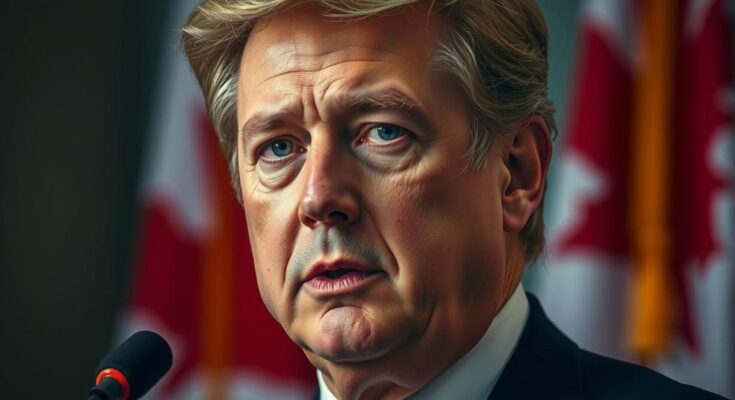US President-elect Donald Trump has announced a 25% tariff on imports from Canada, provoking significant criticism from Canadian leaders, notably Ontario’s Doug Ford. The Canadian government is engaging in discussions with Trump to address the implications of this tariff, while emphasizing the importance of the US-Canada trading relationship. The issue is exacerbated by concerns over illegal immigration and drug trafficking at the border.
Following a declaration by United States President-elect Donald Trump to impose a substantial 25% tariff on imports from Canada, Mexico, and China, widespread concern has emerged, particularly from Canadian officials. Trump has positioned this tariff as a measure to combat illegal immigration and drug trafficking. Doug Ford, the Premier of Ontario, has strongly criticized the proposal, declaring it “devastating” for both Canada and the United States.
The reaction from the Canadian government has been notably cautious, with Prime Minister Justin Trudeau engaging in extensive discussions with Trump and provincial leaders to address the situation. Reports indicated a positive dialogue focused on maintaining cooperation at the shared border, which is deemed a high priority. Canadian ministers underscored the vital nature of the US-Canada trading relationship, noting that Canada was responsible for a significant portion of US crude oil imports in the previous year.
Trump’s tariffs are said to take effect immediately upon his inauguration on January 20, 2025. Ford has called for urgent discussions among provincial leaders to address border challenges, with support also voiced by leaders in Quebec and British Columbia. In contrast, other industry leaders have advised for a calm response, suggesting Trump’s position may be a strategic negotiation tactic rather than a definitive policy.
The security narratives surrounding illegal crossings at the US-Canada border, highlighted by Trump’s new border chief, Tom Homan, have been deemed concerning, albeit less severe than the situation at the US-Mexico border. Recent statistics indicate an increase in illegal crossings from various countries, prompting scrutiny of existing border policies. Experts express that the vast and less fortified northern border presents unique challenges that require concerted efforts to address effectively.
Although Tariff increases have been a theme during Trump’s campaign, they may more likely serve as negotiating leverage rather than fixed policy intentions. Analysts predict a potential shift towards free trade agreements as discussions progress. Overall, the evolving trade and border relations between the US and Canada necessitate continuous monitoring and strategic dialogue to mitigate potential adverse outcomes for both nations.
The context surrounding President-elect Donald Trump’s tariff proposal originates from growing concerns about trade imbalances and border security, particularly regarding illegal immigration and drug trafficking. Tariffs are viewed as a tool to influence trade relations and safeguard domestic industries. The US-Canada trade partnership is historically significant, with Canada being a premier trading partner, and changes in tariffs could substantially impact both economies. The Canadian response reflects a blend of concern and the imperative to maintain robust cross-border relations outweighing immediate defensive strategies. Additional context includes the legislative emphasis on the shared geographical border characterized by extensive trade flows between the two nations, and the ongoing discussions regarding how to fortify it against illegal activities.
In summary, President-elect Donald Trump’s proposed 25% tariff on imports from Canada has prompted significant criticism from Canadian officials, including Ontario’s Premier Doug Ford. While the Canadian government’s response has remained cautious, the potential impact on cross-border trade relationships could be profound. Collaborative discussions are ongoing to address concerns on border security and trade prioritization. The geopolitical implications of these tariffs underscore the need for strategic engagement and negotiation moving forward, particularly in light of concerns regarding illegal immigration and drug smuggling.
Original Source: www.bbc.com




